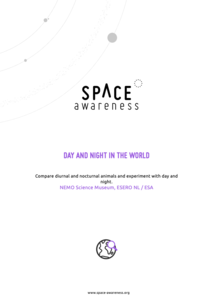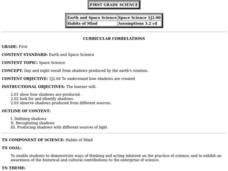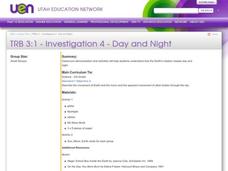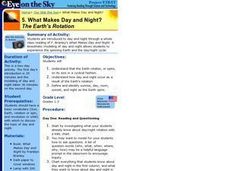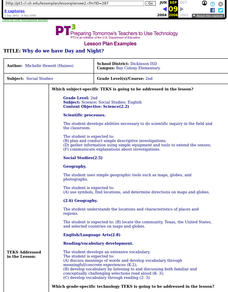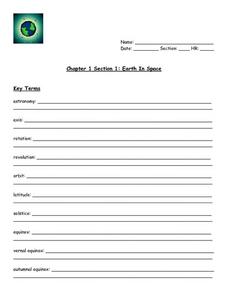Space Awareness
Day and Night in the World
How do different parts of the world experience day and night? Introduce scholars to the concept of global citizenship while teaching about animal behavior with discussion of nocturnal and diurnal animals. Then, learners complete...
Curated OER
Day and Night
Inform your elementary scientists why we experience day and night. They are provided with facts and explanation as to why the day and night cycle occur, discuss what they've learned with a partner, and are then given the task of writing...
Curated OER
Day and Night
Expand your third graders' universe with a science activity about Earth's rotation. They read a short explanation about the direction of sunlight, then draw an arrow to indicate which way the sun is pointed at an illustration of the...
Scholastic
Study Jams! A Day on Earth
It's good thing that it isn't up to RJ to spin the earth on its axis; he can't even keep a basketball spinning! In this video animation, he and viewers learn about Earth's movements in space. One thing to consider before you use this...
Curated OER
Sun and Shadows
Why do shadows look different in the summer than in the winter? What causes day and night? How can a sundial be used to tell time? Answer these questions and more through two engaging lessons about light and shadows. Fourth and fifth...
Curated OER
What Causes Day and Night?
Why do we have four seasons? A series of questions about the Earth's orbit and its impact on seasons challenge Earth science students.The second page of the resource has nine multiple choice questions, such as "One year on Earth is one...
Curated OER
Day and Night
First graders study that day and night result from shadows produced by Earth's rotation. Students work to show how shadows are produced, look for and identify shadows and observe shadows produced from different sources.
Curated OER
Night Here, Day There
Explore astronomy with a lab sheet for fifth grade scientists. After reading a short explanation about the earth's rotation, they solve a word problem about the differences in times across the world. Next, they make a model of the solar...
Curated OER
Tides, Eclipses, Day and Night, and Seasons
In this earth science learning exercise, students use the clues given at the bottom of the sheet to complete the crossword puzzle on tides, eclipses, day and night, and the seasons of the year. There are 17 clues to solve in the puzzle.
Curated OER
Day And Night: Interdisciplinary Study of Cyclic Change
Eighth graders conduct a "Length of Day Symposium." They complete a variety of activities and explorations regarding the earth's rotation, its revolution around the sun and the cyclic changes in climate and energy distribution on the...
Curated OER
Day and Night
Third graders view a classroom simulation that demonstrates how the Earth's rotation creates day and night.
Curated OER
Day And Night
First graders examine how the earth experiences day and night by using a flashlight and a globe as a model.
Curated OER
Introduction to the Day and Night Sky
Students explore space science by participating in a sky observation activity. In this astronomy lesson, students define a list of astronomy vocabulary terms and examine star charts of the four seasons. Students gather with their...
Curated OER
Seasons and Day Time
Learners label a diagram of the Earth rotating about the sun and indicate the direction of the rotation and the seasons at each location. They indicate the seasons, the poles, the hours of daylight at each pole, the direction of rotation...
Curated OER
Day and Night
Fifth graders investigate the Earth's rotation and revolution and the moon's orbit around the Earth. They participate in a class discussion about how night and day occur, and take notes. Next, they watch a video about the solar system...
Curated OER
What Makes Day and Night? The Earth's Rotation
Students discover that the Earth rotates on its axis in a cyclical fashion. They examine how this rotation results in day and night.
Curated OER
Earth's Rotation
Fourth graders investigate the Earth's rotation. In this Earth's rotation lesson, 4th graders realize that the rotation of Earth causes the days and nights on Earth. Students break into groups and use a flashlight and a sphere to...
Curated OER
Day and Night
In this day night compare and contrast worksheet, students examine a picture of the earth and of the sun labeling day, night, equator, sun, North Pole, and South Pole.
Curated OER
What Causes Day and Night?
In this day and night worksheet, students will that day and night are caused by the Earth's rotation on its axis and that the sun shines on different parts of the Earth. This worksheet has 4 fill in the blank statements.
Curated OER
Why Do We Have Day And Night?
Second graders demonstrate knowledge and appropriate use of hardware components, software programs, and their connections. After a lecture/demo, student groups utilize raisins and apples to demonstrate day and night. They put togethre a...
Curated OER
Globe Lesson 11 - Rotation of the Earth - Grade 6+
In this rotation of the Earth worksheet, students read a 2-page review of the rotation of the earth and respond to 10 short answer questions.
Curated OER
Globe Lesson 13 - When the Day Changes
Learners explore the patterns of day and night. In this geography skills lesson, students read brief selections and examine diagrams that note the transition of day and night around the world. Learners respond to the questions included...
Magic of Physics
Rotating Sky
Ever found it difficult to observe the night sky with pupils because school takes place during the day? Host a stellar lesson using a detailed night sky interactive! Scholars view the apparent rotation of the sky from the comfort of the...
Curated OER
Earth in Space
In this reason for the days and nights on earth worksheet, students study the reasons the Earth has days and nights by answering 28 questions about earth's rotation, the equator, the relationship between the sun and moon, and the earth's...


